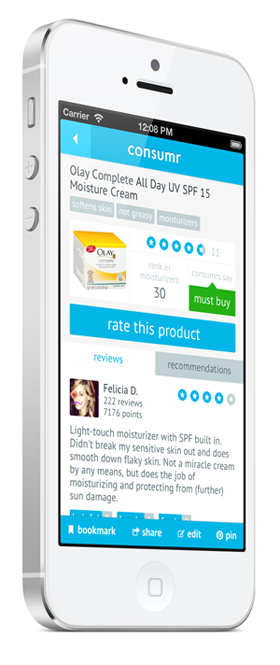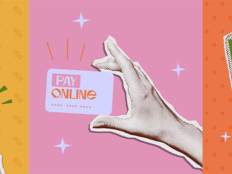Consumr App Powers Informed Purchasing in Brick-and-Mortar Retailers
You enter a grocery store and wonder which floor cleaner will work best for your hardwood floor. Do you rely on the advice of a store associate or the collective insight of the crowd?
If you think the crowd is your best bet, you’re in luck. Consumr, an iOS mobile app and mobile-optimized site, allows you to get feedback from fellow consumers instantly through your smartphone. By scanning the product’s barcode with the app, users can access reviews on the product or write their own.
“Whether it's a beauty product, a frozen food dish or a TV, there really should be a go-to kind of app that's really gonna tell you about the quality of the product,” says Consumr CEO and co-founder Ryan Charles. Charles was previously Zagat’s mobile chief.
Most small businesses are aware of Yelp, the online site where users go to review shops and restaurants. Consumr aims to deliver similarly valuable user reviews to consumer goods.
“[The comparison to Yelp] does very quickly give you an idea of what we're trying to do,” says Charles. “We're trying to level the playing field and democratize shopping.”
By relying on barcodes and UPC data, Consumr can work in any store. Additionally, although barcodes are nowhere near a new technology, they remain uniquely accurate in Charles’ view.
“We're retailer agnostic. You can go to any store and scan the barcode to pull in those crowdsourced reviews,” he says. “One of the reasons we started with barcode scanning is that it's the best way to get a one-to-one match to a product.”
The newest version of Consumr (previously called Consmr) adds a host of new features, including personalized product recommendations, support for nearly 1 million UPC barcodes, filtering by opinions and product attributes, and an expanded product catalog that includes beauty, baby, pets, toys and more.
“We expanded into the categories people were asking about. Baby toys was a No. 1 category,” says Charles. “Parents don't know what to buy, especially for young children. [At that age] it's not about a child saying, ‘Oh, I want this Transformer.’ It's an educational toy.”
How Consumr Got Started
The inspiration for the creation of the Consumr app is, quite literally, messy. A few years ago, Charles was at his sister’s apartment visiting his baby niece. While she was sitting on his lap he realized that his jeans felt a little wet. His sister was trying a new brand of diapers, and they clearly weren’t preventing leaks.
“I realized there really needed to be a way for people to make better decisions at brick-and-mortar retail,” he says.
So Charles called up his best friend of 20 years, and they put together a 1.0 version of the app and launched it in the iTunes store about a year ago. Now the company has raised around $600,000 in venture capital, he says, which has enabled the team to grow from two people to four.

More important, with the cash from investors, he’s now able to offer his Consumr employees basic benefits, which is an issue that startups, especially bootstrapped startups, often struggle with.
“We've got health insurance now,” he says with a triumphant laugh.
The Voice of the Consumer Will Be Heard
Regardless of how retailers feel about the fairness of user reviews, in today’s social media age, they are here to stay. Recent Forrester research found that more than 50 percent of U.S. consumers check ratings and reviews. Furthermore, reviews were cited as the second-most trusted source of information for shoppers after family and friends.
Charles’ advice to retailers is to embrace the crowdsourced era of commerce rather than resist it.
“If you're a brand and you're getting negative reviews, embrace it. Hug it. That tells you there's a subset of people that you're not satisfying,” says Charles.
In fact, user reviews aren’t different from the focus groups that brands and retailers have always performed, he says. It’s just that with the web, the focus group’s conference room door is now blown wide open.
And in Charles’ view, consumers and retailers alike are better off for it.
“People are more inclined to try new things when [other] people have said, ‘Yep, this is already good,’” he says.







